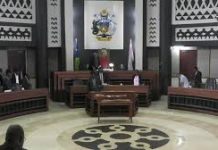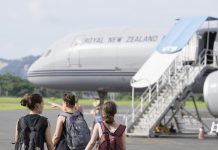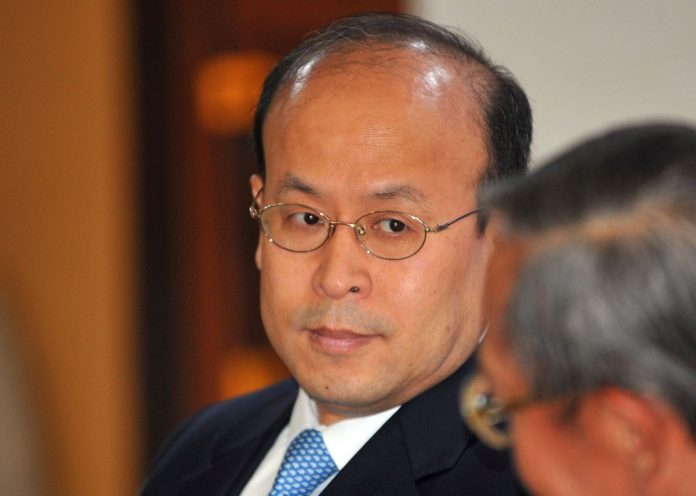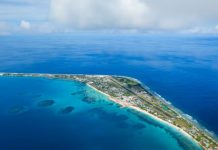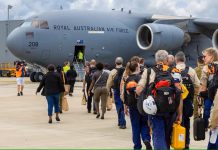Beijing’s growing co-operation with the South Pacific is not a threat to Australia’s security, China’s local ambassador says, amid regional alarm a security pact with the Solomon Islands could pave the way for a military base.
In a further conciliatory sign from Ambassador Xiao Qian, he said common interests between Australia and China should outweigh differences that had fractured diplomatic and trade ties between the two countries.
A senior Solomon Islands legislator has also expressed alarm that an expected visit by Chinese Foreign Minister Wang Yi to Honiara within days to cement its security pact will be turned into a propaganda tour de force for China and the Solomon Islands’ polarising Prime Minister Manasseh Sogavare.
Xiao was dispatched to Canberra in January, charged with attempting to reset the bilateral relationship after Beijing imposed a freeze on ministerial dialogue, targeted more than $20 billion (US$13.8 billion) of Australian exports with bans and punitive tariffs and issued a 14-point list of demands for policy concessions.
But there has been little sign of China changing its stance substantively, while Xiao’s efforts suffered a setback after the secretly negotiated security agreement between China and Honiara was revealed in March.
Australian and other intelligence agencies fear the agreement could be the launchpad to a permanent Chinese military presence in the south-west Pacific, and ultimately a base.
However, Sogavare and China’s Foreign Ministry have denied the agreement would allow a base, maintaining it involves the Solomon Islands’ domestic security following anti-government riots last year in Honiara.
Xiao did not explicitly mention the security agreement in his opinion piece but defended China’s efforts to build ties in the Pacific.
“The co-operation between China and the South Pacific island countries is conducive to people’s wellbeing of both sides and regional prosperity and stability, and will by no means threaten Australia’s security,” he said.
Xiao said China was committed to a policy of peace, having been the victim of aggression in the past.
“China’s rise should not be seen as a threat to Australia. The nature of relations between countries is not determined by their respective size or strength, but the policies they adopt towards each other,” he said.
“A big and strong country that pursues a friendly policy can definitely become a friendly and powerful partner. As China grows, it has always been committed to friendly co-operation with countries around the world, including Australia.”
Xiao said mutual respect was needed between the two countries, including for the different cultures and political systems, although he did appear to suggest the onus was on Australia to “adopt a positive policy toward China” to improve relations.
“China and Australia can absolutely get along with each other harmoniously,” he said. “It is our belief that the common interests between China and Australia far outweigh our differences, and we have every reason to become partners of mutual benefit.
“We expect the Australian side to view China and China’s policies in an objective and rational light, act in the interests of Australia and its people, adopt a positive policy toward China, and work with China in the same direction with mutual respect as the political foundation, so as to push China-Australia relations back on the right track at an early date.”
But speaking at the National Press Club, Joyce said China was now following the same “tactical positioning” of island hopping in the Pacific to deploy forces that Japan did in World War II that threatened Australia’s security then.
“It is imperative in this campaign that the Australian people are fully aware of this. It is not alarmism. It is a reality, and we have to be awake to it,” Joyce said.
“It is quite obvious through their desire to have military bases that they are starting a process of encircling Australia and that there is a wish, at the very least, to intimidate, or worse, to supplicate Australia.”
Asked to reconcile his views that Australia needed to get rich and strong to stand up to the China threat while at the same time China was Australia’s biggest customer for iron ore, a key component of military equipment, Joyce conceded it was a “vexed issue”.
“The thing is, what China will respect is strength. You can’t have a strong military if you don’t have a strong economy,” he said.
Sources have confirmed the Sogavare government is making preparations to host Wang on a ministerial visit to the Solomon Islands.
Solomons Island opposition MP and chair of the parliamentary foreign relations committee Peter Kenilorea said the visit could take place late next week.
He said the Sogavare government had approached security pact critics like himself to take part in the visit as a display of bipartisanship, but he would not take part “if it just looks like a photo op”.
“I don’t want to be used as some sort of pawn. I worry it will be a propaganda visit,” he told the Financial Review.
“It will depend on the details. [If there were] closed meetings, I would think about it. That would be an opportunity to say a piece of our mind as well.”
While Defence Minister Peter Dutton suggested the timing of Wang’s likely visit was “obviously provocative” as it was timed to coincide with the election campaign, former Australian high commissioner to Solomon Islands James Batley said it “seems like a stretch to me” to suggest it was an attempt at foreign interference in the election.
“It would certainly be evidence that China is actively seeking to disrupt Australia and other Western interests in this part of the world,” he said.
SOURCE: AFR/PACNEWS



